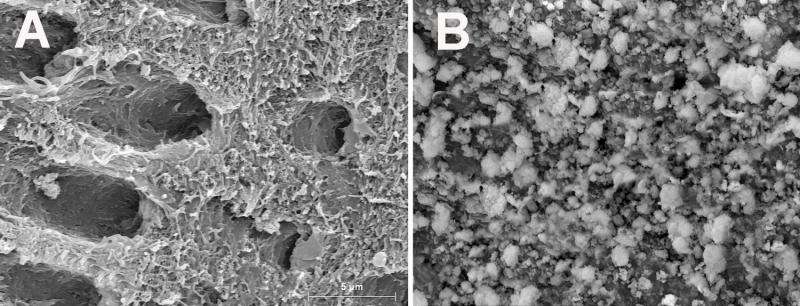Effects of composites containing bioactive glasses on demineralized dentin

Bacterial plaque causes tooth decay due to acids produced by different bacteria species; this has trigged an intense research activity for the development of novel restorative biomaterials with protective and self-healing remineralizing properties. In this new study, Salvatore Sauro, a professor of CEU Cardenal Herrera University (Spain) specialized in the development of innovative dental biomaterials, has collaborated with several researchers from Finland, Brazil, Belgium, Germany and the United Kingdom in order to reach this goal. The collaborative generated two new dental restorative biomaterials containing bioactive glasses, and assessed their effectiveness in reducing the enzymatic auto-degradation of collagen fibres and inducing their remineralization.
The aim of the study was to evaluate the inhibition of endogenous proteolytic enzymes of dentin and the remineralization induced by two different innovative experimental resins containing bioactive glasses: one containing micro-particles of Bioglass 45S5 and another containing micro-particles of an experimental bioactive glass enriched with fluoride and a high amount of phosphates. Their anti-degradation effects were evaluated on completely demineralized human dentin specimens after immersion in artificial saliva for a period of thirty days by means of an immunohistochemical process. The remineralization was also evaluated by means of infrared spectroscopy and scanning electron microscopy.
Greater effectiveness with fluoride and phosphates
According to Professor Sauro and his co-authors, "The resin-based material containing the experimental bioactive glass enriched with fluoride and phosphates [was] more efficient in inhibiting the enzymatic-mediated degradation of demineralized dentine collagen, and more bioactive than the one containing Bioglass 45S5. This was mainly due to the fluoride ions, as well as to the large amount of phosphates released by the material, which accelerated dentin remineralization and reduced the degradation of demineralized dentin collagen via inhibition of matrix metalloproteinases and cysteine cathepsins.
This type of experimental bioactive material would therefore be more suitable for the development of new restorative dental materials for the clinical treatment of the dental caries.
Professor Sauro spends most of his time in the development of minimally invasive treatments and therapeutic bioactive dental composites for the treatment and restoration of caries-affected dentin, such as the samples tested in this study. He pursues treatments that are able to prevent the degradation of dentin collagen and evoke the remineralization of demineralized dental tissues.
More information: A. Tezvergil-Mutluay et al. Effects of Composites Containing Bioactive Glasses on Demineralized Dentin, Journal of Dental Research (2017). DOI: 10.1177/0022034517709464



















